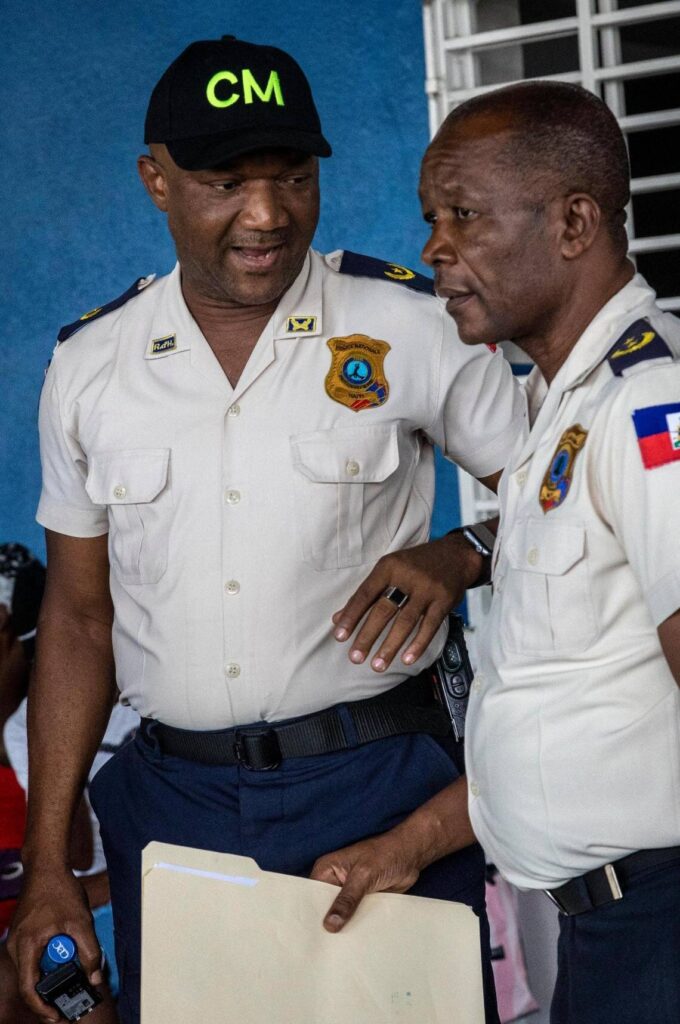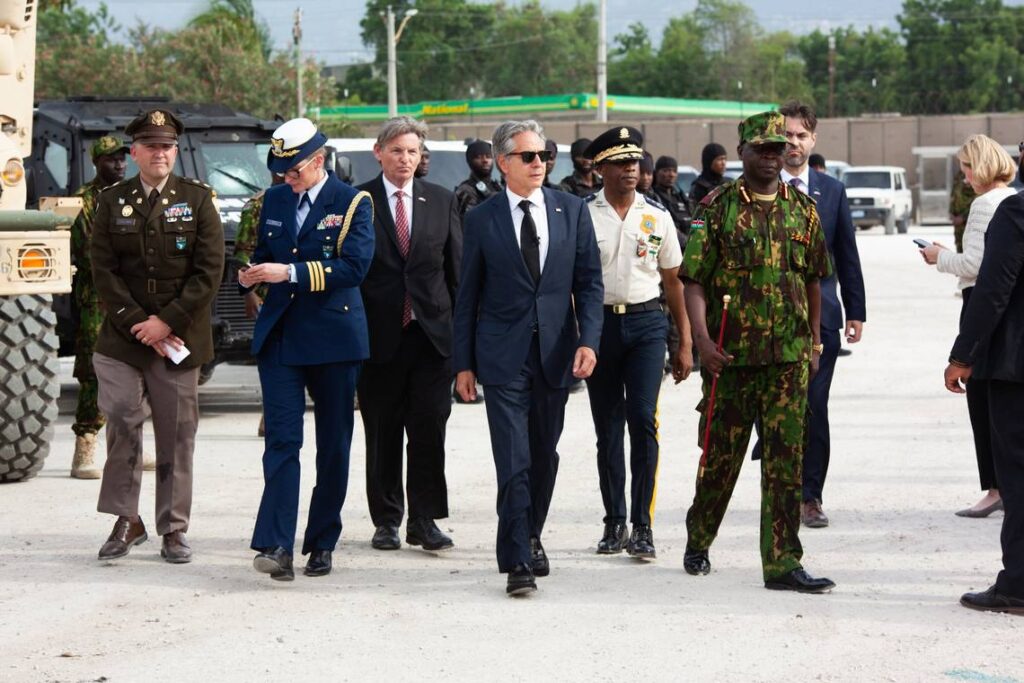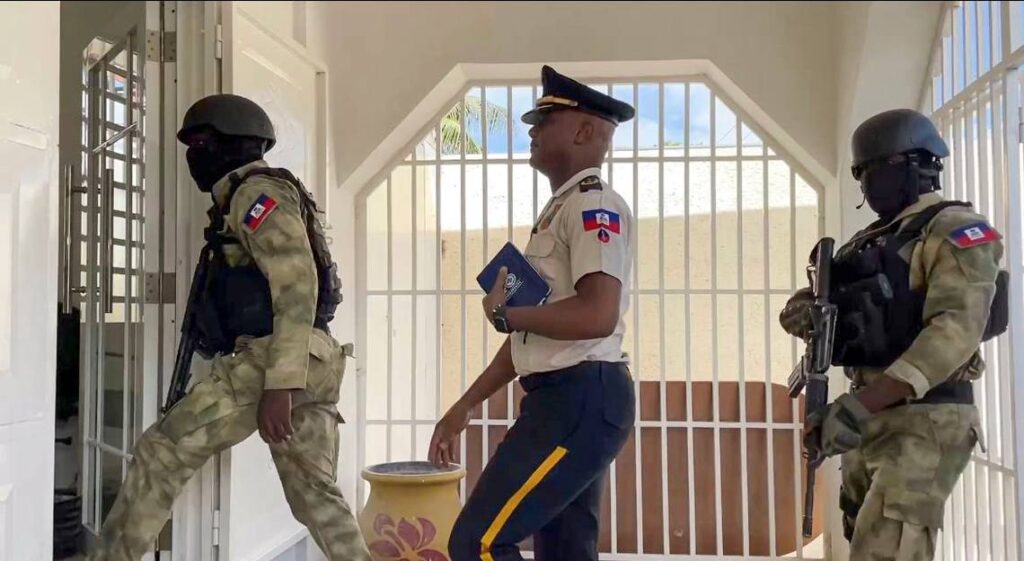PORT-AU-PRINCE — As U.S. Secretary of State Antony Blinken traversed Haiti’s gang-controlled capital in early September, a sinister plot was unfolding.
On the afternoon of September 5, a man driving a motorcycle was fatally shot next to a hospital not far from the U.S. Embassy in Port-au-Prince, in what has been described by authorities as an extrajudicial police killing.
Who carried out the brazen execution is now the subject of a highly controversial arrest and inquiry by a Haitian investigative judge. Eight days after the slaying, a senior police officer known for combating armed gangs was arrested along with three others. But the officer, Livenston Gauthier, and his defenders assert he was nowhere near the fatal shooting of the motorcyclist, saying he and other officials were leading a security force safeguarding Blinken during his first visit to the volatile country.
On Tuesday, after publication of this story online, the Miami Herald obtained an exclusive video from a Haitian journalist’s blog site, Machann ZEN HAITI, showing Gauthier’s dark green pickup police vehicle at the front of Blinken’s motorcade as it was entering Gate 7 at Toussaint Louverture International Airport around the same time as the alleged hit on the motorcyclist.

Livenston Gauthier, left, a 27-year-veteran of the Haiti National Police, speaks to Roger Lamartinière, the then-head of the Croix-des-Bouquets police station. In 2022, both men had worked together to stave off control of the eastern region of Port-au-Prince by violent gangs. Photo by: Jose A. Iglesias /Miami Herald
Gauthier is a 27-year veteran of the Haiti National Police, serving most recently as the senior police commissioner of the Tabarre municipality in Port-au-Prince. He was held in police isolation for weeks and then transferred to a jail cell at a police station despite a court ordering his immediate release after finding his arrest and prolonged detention to be illegal.
The case has raised questions about how the Haiti National Police, under new command as it tries to stop violent gangs in a fresh wave of attacks, investigates and treats its own officers. It has also raised questions about a possible police cover up, while reigniting concerns about the use of excessive use of force and extrajudicial killings by the Haitian police, a practice the U.S. government, United Nations and human rights groups have long denounced.
MURKY FACTS
Gauthier, 52, is accused of being the intellectual author behind the execution. He was arrested along with a senior police inspector, Jean Claude Aimé, who is accused of being an accomplice, and two police informants accused of pulling the trigger.
After nearly three weeks in isolation, Gauthier was transferred to a jail cell inside the Canape Vert police station where he’s currently being held with 10 other prisoners — still in his police uniform.
The facts around the case remain murky. From the outset, Haitian police have publicly declined to provide information about the killing, including the victim’s background and possible reason for being targeted.
Also unclear is why a recommendation by the internal affairs commission to lift Gauthier’s isolation was ignored.
Several police officers claim that the victim was the subject of a police investigation and a bandit with alleged ties to Vitel’homme Innocent, the powerful gang leader who is the subject of a $2 million FBI bounty and has been escalating attacks in Tabarre over the past few days, including the targeting of U.S. Embassy vehicles. A Haitian police officer with knowledge of the execution claims that the victim was killed because he was involved in trafficking.
Days before his Sept. 13 arrest, Gauthier said he had received a call from his supervisor, Xavier Seide, one of two police directors in charge of the Departmental District Ouest region of metropolitan Port-au-Prince days. Seide told him that if he was asked about an operation in his Tabarre jurisdiction, referring indirectly to the motorcyclist’s execution, Gauthier should say he knew nothing about it. Seide then called back two days later and informed him that “this is making a lot of noise. I told them you were in Blinken’s motorcade.”
Seide told the Miami Herald he could not comment on an active police investigation and referred questions to the spokesperson of the Haiti National Police. The Herald forwarded the questions to police spokesman Michel-Ange Louis-Jeune, along with a copy of questions sent to Rameau Normil, the police chief. Neither responded.

U.S. Secretary of State Antony Blinken, wearing shades, touring the Multinational Security Support mission based in Port-au-Prince, Haiti on September 5, 2024, the same day an extrajudicial killing would be carried out, according to police. Blinken is joined by Haiti Police Chief Rameau Normil, head of the MSS Force Commander Godfrey Otunge and U.S. Ambassador Dennis Hankins, among others. Multinational Security Support mission on X
NO SUPPORTING EVIDENCE
The Haitian national police’s investigative report provides no hard evidence tying Gauthier to the killing, according to a copy obtained by the Miami Herald. There is no ballistics report matching the bullets in the victim to the weapons seized from Gauthier’s vehicle. Despite the mention of cameras in the area, there are no images of the scene. There is also no evidence in the report that Gauthier, ordered the killing, which has been described as the shadowy workings of a police hit squad.
Instead, the police report highlights a text message sent to Gauthier by the administrator of St. Damien Pediatric Hospital informing him of a corpse lying next to the hospital.
The report says Gauthier responded: “I know. I will do the follow-up.”
The police report also cites the testimony of one witness, a cousin of the dead man. The witness, Rony Charles, said he was at Tabarre 41 near the hospital that afternoon speaking to the victim, Hubert Colo, known as Bouki, when he was shot in the head, apparently with an assault rifle, after one of the assailants used a phone to make a positive identification.
According to the police’s 16-page investigative report, Charles said Colo, 25, was sitting on his bike at the taxi stand when a green Isuzu pick-up truck bearing the inscription “POLICE” in yellow pulled up and forced everyone to scatter.
“Four armed individuals, hooded, dressed in black descended from this vehicle and … fired several bullets at” Colo, the report said. “The victim died on the spot.”
A woman was also seriously injured, the report said, before the attackers got back in their their vehicle and drove off in the direction of the Tabarre road toward the U.S. Embassy.
The police report said Charles identified Gauthier’s vehicle from a photo. Charles said “the vehicle looked like the one that was present at the crime scene,” according to the report, adding that the witness said he could not provide the license plate number.
Several police sources have told the Herald that there are at least three similar dark green police pickups, including one now in the possession of the Kraze Baryé gang, which commandeered it from a specialized police unit.
Another source, who said Colo was unarmed when he was gunned down, said another witness to the incident actually described a different vehicle.
Two policemen and a third individual closely following the case told the Herald that the actual vehicle used in the hit was a pale green pickup assigned to the Haiti National Police’s Departmental District Ouest 2 region that oversees Tabarre. The vehicle, which once belonged to the G-PEP gang coalition in Cité Soleil, has been repainted since the incident, the cops said.
The investigative report also failed to provide even the most basic information: The time the execution happened. It speaks of the afternoon of Sept. 5. A separate report, in which a justice of the peace documented Colo’s death, listed the time of the incident at 4:30 p.m. that day — the same moment Blinken was headed to the Multinational Security Support mission near the airport to visit the 380 Kenyan soldiers who have deployed to Haiti to help the police fight armed gangs.
Several police officers involved in coordinating Blinken’s visit, and another with knowledge of the execution, said Gauthier was in the secretary of state’s motorcade. One source said Gauthier was at the head of the motorcade. The sources question how he or his police vehicle could be in two places at the same time, and they voice serious doubts about the integrity of the police investigation.
As Blinken’s motorcade arrived in front of Toussaint Louverture International Airport about 4:40 p.m., Gauthier pulled his police pick-up truck to the left to allow the vehicles behind him to pass, a police source said.
“The U.S. embassy can easily clear this up; all they have to do is look at their cameras,” said one of the police officers in touch with Gauthier that day and who like others interviewed for this story asked not to be identified for fear of retribution.
A State Department spokesperson declined to address specifics about the case, including what time Blinken left the embassy or arrived at the MSS base. According to a police source, Blinken arrived at the U.S. Embassy in Tabarre around 2 p.m. He left around 4:20 p.m. for the MSS base, arriving 20 minutes later.
“We do not comment on an ongoing criminal investigation conducted by the Haitian national police nor on security resources used or requested for protection operations,” the State Department spokesperson said.
PROSECUTOR IGNORED COURT ORDER
In late September, Haitian attorney Mario Delcy challenged the legality of Gauthier’s arrest and detention in an emergency court hearing. In a court filing, he said the General Inspectorate, Haiti police’s internal affairs section, had determined that his client “was at the head of the procession that escorted the U.S. Secretary of State Mr. Antony Blinken throughout the day.”
The day after the September 26 hearing, the head of the court ordered the prosecutor to release Gauthier after determining his arrest and detention were arbitrary and illegal, and that his constitutional rights were violated when he failed to go before a judge within 48 hours of his arrest.
Despite the court order, prosecutor Carl Giovanni Aubourg refused to release Gauthier, giving himself tme to appeal the decision and for Gauthier’s file to be transferred to an investigative judge.
In a country where judicial cases are known to move at a snail’s pace, the case against Gauthier, who was head of the police substation in the municipality of Tabarre where the U.S. embassy is located, has moved at lightning speed.
“They haven’t respected the norms, they haven’t respected the procedures,” said human rights advocate Pierre Esperance, whose staff at the National Human Rights Defense Network was twice prevented from seeing Gauthier while he was held in isolation.
Esperance said the Haiti National Police’s lack of transparency around the Gauthier case is worrisome. Among his questions: Why was the senior police officer immediately detained by the judicial police when he wasn’t caught committing a crime, instead of having the case remanded over to internal officers for an administrative inquiry? Esperance said he also takes issue with Gauthier’s continued imprisonment.
“Once someone benefits from a provisional release, no one has the right to block it,” Esperance said.
Esperance’s National Human Rights Network is a leading critic of state authorities and human rights violations, including by the police. Still, police officers deserve due process and fair treatment once accused, he said.
Up until his September 13 arrest, Gauthier had the reputation as one of several key police officers and precinct heads fighting against armed gangs, especially Kraze Baryé, whose leader, Vitel’homme Innocent’s is among the FBI’s “Ten Most Wanted.”
Esperance said the way the Haitian police have pursued the case against Gauthier has demoralized officers inside a force that is already wrestling with internal tensions.
“It’s given the perception they are arresting police officers fighting against gangs,” he said. “Even if the police commissioner committed an infraction and did something wrong, they need to treat him with serenity and with dignity as a police officer who is serving the population.”
CONCERNS OF POLICE ABUSE
The U.N. independent human rights expert last month expressed alarming concern about continuing corruption involving members of the Haitian national police and extrajudicial killings.
Some police and legal experts say they believe Gauthier, who has become a suspect such a killing, is now a victim of a personal vendetta.
Weeks before the murder, Aubourg, the prosecutor for Croix-des-Bouquets who appealed Gauthier’s release, got into a disagreement with the veteran officer. Gauthier had blocked the prosecutor’s attempt to reprimand two of his officers and then later corrected Aubourg’s misspelling of his first name before kicking him out of the Tabarre police station. All of this incensed the prosecutor, who accused Gauthier of not respecting authorities, the policeman said.
“He wanted to see me in prison,” Gauthier said about the prosecutor.
The Herald sent Aubourg a list of questions about the case. He addressed only the allegations that he blocked Gauthier’s release from custody before the case was transferred to an investigative judge. Aubourg said he did not.
In Tabarre, residents and police once under Gauthier’s supervision have blocked roads and erected burning barricades to demand his release. When he appeared before the investigative judge on Oct. 14, he was greeted by applause and nods of encouragement. ‘
INVESTIGATION IS ONGOING’
Gauthier told a four-person commission from police internal affairs, and then the investigative judge assigned to his case, that he had nothing to do the execution and didn’t give orders to any hit squads in his district.
Aside from the criminal investigation, Gauthier is facing a separate administrative inquiry by internal affairs on how he handled the assassination of the motorcylist in his jurisdiction.
“All I will say is that the investigation is ongoing,” Delcy, his lawyer, said. “The commissioner gave all of the information, where he was that day, everything that happened he provided in detail. And I believe in the coming days the judge will question other people.”
By JACQUELINE CHARLES and JAY WEAVER/Miami Herald




